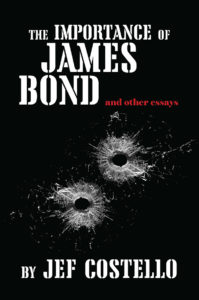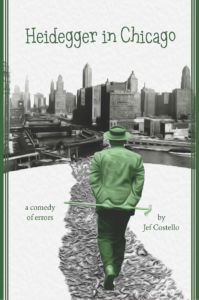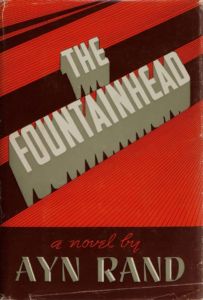The Fountainhead: 80 Years Later
It’s been 80 years since Ayn Rand’s novel The Fountainhead was published by Bobbs-Merrill, and almost exactly 37 years since I first read it. I was in college at the time and, although I did not realize it, searching for some source of meaning in my life. The previous year I had gone through a Satanist phase, occasioned by reading Anton LaVey’s Satanic Bible and failing to see the humor in it. That had been followed by a very, very brief Marxist phase.
Perusing the public library, I had come across a red-covered volume titled, as I recall, Principles of Scientific Socialism and written by Gus Hall, General Secretary of the Communist Party of the USA. The book was written in an accessible style and, though it raised many questions in my mind, it seemed to offer ideas that made sense out of everything — which is what I was desperately seeking. Besides, it scandalized my mother, which delighted me. She informed me that if I became a Communist she would have to disown me. Two minutes of conversation were sufficient to establish that she had no idea what Communism was. Still, I must give her credit for good instincts.
And it was my mother who was also, quite literally, the vehicle of my abrupt conversion to anti-Communism. Just about a month after I read Gus Hall’s book, my mother announced one afternoon that she was going to the public library and asked if I’d like to tag along. I said yes. This one, uncharacteristically spontaneous act changed my life momentously. I shudder to think how things might have turned out had I declined. At the library, in one of those revolving racks of paperbacks, I found a fat, 700-page book with small print: Ayn Rand’s The Fountainhead. I had heard of it before, but very vaguely. I knew next to nothing about it.
I showed the book to my mother. “People thought she was crazy,” she said. That was enough of a recommendation for me. I added The Fountainhead to my mother’s pile and moments later I was next to her in the car, reading Rand’s Introduction to the 25th anniversary edition of the novel. In it, she noted that some readers had wondered if she or the novel’s main character, Howard Roark, were religious. Rand commented that she thought she had made her atheism (and Roark’s) perfectly obvious. For me, this was the clincher — the thing that guaranteed that I would plow all the way through this daunting tome. You see, at the time I was going through my Village Atheist period. I am embarrassed to say it now, as my views and values have changed so much, but at the time I felt I could not respect an author who was religious.
The Fountainhead is the story of Howard Roark, an iconoclastic architect who insists on his buildings being built exactly as he designs them, and refuses to compromise. He is surrounded by mediocrities who have never had an original thought in their lives, but who have learned how to game the system. They flourish while Roark is reduced to working in a granite quarry — though ultimately he triumphs. These people are leading what Rand called “second-hand lives,” the novel’s original title. Even two of the story’s most sympathetic characters — Dominique Francon, the woman Roark loves, and Gail Wynand, his best friend — are portraits in second-handedness.
A ”second-hander,” in Rand’s vocabulary, is a person who somehow derives his sense of selfhood from other people. In other words, he gets his views and his values second-hand. One of the novel’s major characters, Peter Keating, is a second-hander in a very simple and obvious way: He is an abject conformist and parasite. He has never had an original idea of his own. He makes up his mind about every issue by consulting public opinion. Keating is a highly successful but untalented architect, who simply copies the styles of the past and never comes up with anything new.
The case of Dominique Francon is more complicated. She worships greatness; she seeks the exceptional in life. More than anything, she admires man’s capacity to create things of beauty. But she is so terrified of society and what it is capable of doing to exceptional men, she actively seeks to destroy examples of human greatness rather than see them exposed to the bad taste and ressentiment of “the mob.” In this way, she is ruled by others, though her core values are identical to Roark’s. Wynand is the fabulously wealthy owner of The New York Banner, a newspaper that engages in the worst sort of yellow journalism. Wynand’s second-handedness consists in the fact that he seeks power over other men. Rather than using his considerable talent and intellect to create something of real value, he panders to the taste of the masses and imagines that he controls them. In fact, they control him.
The Fountainhead is the story of how the lives of these characters intersect. However, there is an additional character I cannot fail to mention. The improbably-named Ellsworth Toohey is the villain of the piece. Like other Russian novelists, Rand crafted character names to convey something about the characters themselves. Toohey is a glib, obsequious “public intellectual” who poses as a selfless humanitarian. In fact, he seeks power over others by controlling them through guilt. He also acts to destroy men of real talent (like Roark) while championing mediocrity (like Keating) out of a hatred for the exceptional and in the name of “equality.”
A completely self-aware villain, who eventually confesses his motives to Keating, Toohey is an implausible character — but at the same time Rand’s portrayal of him is a brilliant, and often very amusing, dissection of the Left. In seeing the Left as moved by ressentiment, Rand was influenced by Nietzsche, whom she read avidly as a teenager. In fact, Rand originally intended to open each of The Fountainhead’s four parts with a quotation from Nietzsche. She decided against this, fearing (correctly) that readers would assume she was a disciple of the philosopher. Plus, the character of Gail Wynand, with his parasitic “will-to-power,” was actually intended as a “refutation” of Nietzsche (though it is a superficial one).
Of course, I was aware of none of this when I read the novel for the first time. I recall that the first thing that impressed me was Rand’s description of how other characters reacted to Howard Roark. They tended to find him off-putting, intimidating, cold, and inexplicable. Often, they resented him. I could identify with this. For most of my life, people have reacted to me oddly. They have found me, well, off-putting, intimidating, cold, and inexplicable. In school, it got back to me that my professors thought me “arrogant” — just like Roark’s experience at the Stanton Institute of Technology — though unlike Roark, I was not expelled. As I read the novel, I began to identify with Roark — though to some extent this was self-flattery. (I’ll discuss my mature impressions of the character later on.)
The other thing that really struck me was how serious all the characters were about ideas. Much of the novel consists in intellectual conversations that go on for pages. At one point, Roark makes a speech that spans about eight pages. I didn’t know what to make of such people. At this point in my life, I’m afraid I had arrived at a kind of glib, adolescent cynicism about ideas. Rand’s characters made me feel ashamed of myself. They took life seriously; I did not. I felt I needed to be more like them. And I longed to have friendships like they did. Friendships with other smart people who shared my values, despised mediocrity and conformity, and liked to talk about ideas into the wee hours. I’m pleased to say that, eventually, I developed such friendships.
By the time I had finished The Fountainhead, I was completely seduced by Rand. However, I was not entirely cured of Gus Hall’s Marxism — not yet. I had been reading about Abraham Maslow in psychology class. Maslow is the one who theorized that the goal of human life is “self-actualization,” which we become capable of reaching when the more mundane needs of life have been satisfied. Howard Roark seemed to me like a self-actualized individual. If socialism might be the best way to satisfy life’s mundane needs, couldn’t socialism produce a whole society of Howard Roarks? Fortunately, I was completely cured of this naïveté when I read Rand’s next — and final — novel, Atlas Shrugged.
It is impossible for me to fully convey to you how exciting it was to read Ayn Rand for the first time. It was a truly golden period in my life. It felt like an entirely new world had opened up for me. Reading Rand, especially The Fountainhead and Atlas Shrugged, was one of the most exciting experiences of my entire life. And it changed my life in extremely important ways. I had had some vague idea that after college I was going to try to break into Hollywood as a writer (cinema was one of my passions). After reading The Fountainhead, I decided to devote my life to ideas. I cleaned up my act — lost weight and finally lost my virginity.
Now, all the above is a long lead-in to the following: On a whim, I recently reread The Fountainhead. I was going through a dry spell so far as reading goes and just couldn’t find a new book that interested me. When I began the novel, I was amazed at how much I remembered with great clarity, as if I had read the book yesterday (as I mentioned, I first read it almost exactly 37 years ago). There were certain details, however, that I had forgotten. These often surprised and delighted me.
I went back to the book with some initial hesitation. It’s always very disheartening — for me, at least — to go back to something I loved long ago, only to find that it has not aged well and I can no longer enjoy it. This is true of some of the films and television shows I loved as a boy. I didn’t want my golden memories of The Fountainhead to lose their luster. So, I was very pleasantly surprised to find that I found the novel quite enjoyable. Now and then there would be a line I thought an editor could have improved on. But, on the whole, Rand is an excellent writer. My opinion of her talent remains undiminished. And once again I did find the book to be inspiring — though with the addition of 37 years of maturity, my reaction was a bit more subdued.
Interestingly, just as happened the first time I read the novel, I felt a sense of shame. I felt a keen sense that I had, to a degree, betrayed my youthful idealism. In the intervening years I’ve suffered, at times, from depression and self-doubt. And I’ve become more neurotic with age. It’s hard to imagine Howard Roark needing to check the stove several times before leaving the house, or worrying about his prostate. Of course, Rand had a sensible answer to this. She didn’t think that real-life heroes were without flaws. Her fiction portrayed men as they “might be and ought to be.” “In life one ignores the unimportant; in art one omits it,” she once said. Still, the stove-checking is beneath me, and I know it.
I still share Rand’s — and Roark’s and Dominique’s and Wynand’s — misanthropy (more on that in a moment). But in order to survive in my career — from which I am now blessedly retired — it was necessary for me to care, for the first time in my life, what other people thought of me. It was necessary for me to charm others and sometimes to outright con them. I lived a lie for many years, concealing my true opinions from everyone around me. I did all this with a skill Peter Keating would have admired. These reflections have been good for me. Rereading The Fountainhead has made me want to recapture a bit of the old Jef, before he started compromising.
Unlike the first time, however, the novel has not filled me with a sense of optimism. The world of today seems to me to be far worse than the world Rand depicts — even with all its moochers, looters, parasites, and second-handers. In today’s world, Roark would have been “canceled” in about 15 minutes given his apparently non-consensual sex with Dominique, his toxic masculinity, and his accursed whiteness. He would never have built anything at all. Today’s Tooheys would have seen to it that all those jobs went to BIPOC architects (if, indeed, there are any). Roark would have remained permanently in the granite quarry — if he’d managed to avoid jail.
Today, every newspaper and media outlet is The New York Banner. In our world, Roark’s Stoddard Temple would not be turned into a school for “sub-normal” children — for the simple reason that every school is now a school for sub-normal children. When Keating’s career began to falter, he would have come out as Petra Keating. Dominique would be a lipstick lesbian with an eating disorder, defiling herself on TikTok, Madonna-like, with various phallic objects. If Roark had dynamited Cortlandt and been acquitted (which seems highly improbable, even in Rand’s world), he would have lost everything in the subsequent civil suit. But there is a happy ending, folks. Readers have often commented that there is something “homoerotic” about the Roark-Wynand friendship. In today’s world, they would have gone all the way, married, and adopted a sub-normal African child (is there any other kind?).
In short, the character with whom I now I identify most strongly is Dominique. I really do feel like we are living in a world where, to use her words, beauty and greatness have no chance. Unlike Dominique, however, I’m not acting to destroy what remains of beauty and greatness before the mob can get at them. Instead, I am acting to defend those things — especially the beauty and greatness of the West.
I no longer identify with Howard Roark, if I ever really did. Rereading the novel, I found Roark to be little more than a cipher. He’s rather boring, actually — and, in my lay opinion, most definitely somewhere on the autism spectrum. Ironically, given that Roark is Rand’s first attempt at the projection of an “ideal man,” the characterizations of Keating, Dominique, Wynand, and Toohey are far more vivid. By the end of the novel, we feel like we know them, whereas Roark just seems like that creepy redhead somebody brought to the party who didn’t say a word to anyone, but ate all the dip.
As much as I admire The Fountainhead, if I still agreed with Rand’s philosophy, obviously I would not be writing for Counter-Currents. But of all Rand’s works, The Fountainhead is the one I find least philosophically problematic (which is not the same thing as saying that it is unproblematic). That’s because all the madness about the virtues of unbridled greed and laissez-faire capitalism appear for the first time in Atlas Shrugged. In The Fountainhead, there are only hints of these things. Indeed, if you read The Fountainhead knowing nothing else about Rand, you might come away with the impression that she is a critic of capitalism.
In The Fountainhead, every time Rand refers to anything commercial, anything that is a product of the market, it is to comment wryly on its vulgarity. Most amusing is the fictitious Hollywood studio she creates, Cosmo-Slotnick Pictures, which releases films with titles like I’ll Take a Sailor, Wives for Sale, and Knock Me Flat. Wynand, of course, makes his fortune by pandering to the bad taste and moral hypocrisy of the masses. But almost everything in capitalism works that way! Additionally, most of the businessmen portrayed in the novel are cowardly or downright crooked. If you had never heard of Atlas Shrugged, you could very well form the impression from The Fountainhead that Rand is a quasi-Nietzschean champion of an aristocracy of naturally superior men. (Indeed, there are comments in Rand’s journals that suggest she at one time entertained exactly such thoughts!)
Philosophically, The Fountainhead concerns itself mainly with the opposition between second-handedness and individualism. I find myself in complete agreement with Rand’s contempt for the second-hander. This, too, is something that has gotten worse over time. Peter Keating is bad, but nowhere near as bad as the mindless NPCs we have today with their clucking over “misinformation,” their craft beer, and their Pfizer tattoos. But individualism is quite another matter. Rand’s ideal is basically “every man for himself,” with charity toward none.

You can buy Jef Costello’s The Importance of James Bond here
Her depictions of Roark’s friendships are often moving. In addition to his friendship with Gail Wynand, there is also Steven Mallory (a sculptor), Austen Heller (a writer, modeled on H. L. Mencken), Mike (a construction worker), and others. These people clearly love Roark, and he returns the feeling. But there is absolutely no general feeling of benevolence directed toward outsiders — I mean, those outside this circle of friends. In fact, The Fountainhead has to be recognized as one of the most misanthropic novels ever written.
Rand would vigorously protest this claim — which has been made by many others, and about other Rand books as well. One reviewer of Atlas Shrugged noted that it “makes well poisoning seem like one of the kindlier arts”; another — former Communist spy Whittaker Chambers — wrote “From almost any page . . . a voice can be heard, from painful necessity, commanding: ‘To a gas chamber — go!’” Rand would have responded that all of her work was a hymn to man’s greatness, not an attack on man. But one has to distinguish between men as they are and men as they ought to be — meaning, men as they seldom are. With a very small number of exceptions, Rand despised actual human beings, and The Fountainhead is simply dripping with contempt for humanity.
The following is a typical passage. In it, we hear the thoughts of Gail Wynand late in the novel, after he has seen the light:
That woman sitting on the stoop of an old brownstone house, her fat white knees spread apart — the man pushing the white brocade of his stomach out of a cab in front of a great hotel — the little man sipping root beer at a drugstore counter — the woman leaning over a stained mattress on the sill of a tenement window — the taxi driver parked on a corner — the lady with orchids, drunk at the table of a sidewalk café — the toothless woman selling chewing gum — the man in shirt sleeves, leaning against the door of a pool room — they are my masters. My owners, my rulers without a face.
Now, I am not making the claim that we need to love everyone. I am not Ellsworth Toohey. But in a healthy, functioning, cohesive society, there does need to be a general feeling of benevolence towards others — the feeling that we are all in this together; the ability to empathize, to feel “he’s like me.” But Rand didn’t care anything at all about cohesion. She despised what she called “collectivism” (you can always spot an Objectivist writer, because nowadays they’re the only ones who still use that word!). When Roark announces that he will “never be a part of any collective,” I immediately thought, “Too late!” We’re all born into a collective; born into a society that rears us, impresses its standards and mores upon us, and limits us in various ways, but also makes it possible for us to realize ourselves in other ways.
An Objectivist might agree with the above, and then defend being a good citizen and acting to safeguard the social structure by arguing that it is in our “rational self-interest” to do so. But that’s not why real people do it. That’s not why they take into consideration “the common good” (a concept Rand despised). They experience “fellow feeling”; that feeling I described above as “He’s like me.” If you want a sense of what a Randian society would really be like, just look around you. There’s no fellow feeling anymore. That’s gone, and we now live in a “low-trust” society. It really is “every man for himself.” During the Great Depression, hobos used to come to my grandmother’s door begging for a meal. She would have them wait on the porch, go to the kitchen, make them a sandwich, and bring it out to them. Can you imagine that happening today, even in a small town?
“Diversity,” of course, is one of the principal reasons why we now live in a low-trust society. As most of my readers know, studies show that diversity destroys social trust, even among people of the same group. One of the main reasons European-style socialism has never really been able to take root in the United States is that the “producers” (that’s Rand-speak; let’s just call them white people) do not want their money going to “those other people,” with whom they do not identify. If those other people weren’t other at all, but just like them, opinions would likely be quite different. It’s so easy to be an Objectivist in the US (where Rand has always been most popular). A majority of white Americans already reject socialism, because most of its intended beneficiaries in the US are so genetically dissimilar to them. But they don’t reckon with this consciously. It’s easier to claim that the real reason they reject socialism is their commitment to rugged individualism.
Why did Rand have so little fellow feeling? After all, The Fountainhead was written at a time when America was much more cohesive, and it was much easier to identify with your fellow countrymen. I can testify from several years spent in the Objectivist movement that it is filled with spergs and sociopaths. Rand and especially her erstwhile lover and collaborator Nathaniel Branden exhibited some distinctly anti-social personality traits. But another factor must be mentioned, something I have not so far discussed: Rand’s Jewishness.
Now, I’m as Jew-wise as the next guy on the Right, but, like T. S. Eliot, we need to be intelligent about it. I’m not one of those people who thinks everything ever done by any Jew is worthless because either it’s (a) derivative, or (b) all part of a sinister plan to advance Jewish interests. Occasionally, Jews do something that fits neither category. Mahler’s Fifth Symphony comes to mind. So does The Fountainhead. The Fountainhead is a genuinely great novel, filled with prose that is powerful and often quite beautiful, well-plotted, and intellectually stimulating. Is there a Jewish angle — I mean, a way in which Rand’s Jewishness influenced the book?
It is possible to do a Kevin MacDonald on The Fountainhead and argue that its anti-collectivism serves Jewish interests. Breaking down all sense of collective identity other than their own is a standard Jewish strategy. Bu if Rand’s anti-collectivism is a pro-Jewish strategy, I’m convinced it was purely unconscious on her part. Please remember that Kevin MacDonald’s position is not that Jews are always consciously acting to promote Jewish interests. Sometimes they are, but often their pro-Jewishness is not conscious at all, but simply a matter of how they are wired; how they behave instinctively.
I do think it is plausible to see Rand’s misanthropy as influenced by her Jewishness. It’s got to be the case that at least one of the reasons Rand failed to identify, on any fundamental level, with most of the people around her is that the genetic dissimilarity was too great. Here, too, however, I am convinced that this was mostly subconscious on Rand’s part. To judge by Rand’s fiction, and her marriage to Frank O’Connor, she was attracted to Nordic types (rather like the Jewish male’s attraction to the shiksa). But genetic similarity played a strong role in the formation of the Objectivist movement. Nathaniel Branden — real name: Nathan Blumenthal — was a Jew; indeed, he supplanted O’Connor for a period, at least in terms of Rand’s sexual interests. Branden’s wife, Barbara, was a Jew, as was her cousin Leonard Peikoff, who eventually became pope of the entire movement.

You can buy Jef Costello’s Heidegger in Chicago here
The West Coast branch of Objectivism, centered on The Ayn Rand Institute (ARI), is heavily Jewish. Its founding board of governors included Harry Binswanger, Robert Hessen, George Reisman, and Peter Schwartz — all Jews. ARI has been staunchly Zionist for years — despite the fact that this is a form of collectivism. Indeed, it was headed for many years by Yaron Brook, a former First Sergeant in Israeli military intelligence. Fascinatingly, the East Coast branch of Objectivism, centered on The Atlas Society, is much less Jewish. One day, somebody needs to give Objectivism the full Kevin MacDonald treatment, but that is beyond the scope of the present essay. In the meantime, check out my parody of Rand and the Objectivist movement in my novel, Heidegger in Chicago.
As someone once said, “Everyone has their favorite Jew.” Mine is Ayn. I have moved far away from Ayn Rand’s philosophy, but I don’t at all regret my youthful dalliance with it. Had I not encountered Rand all those years ago, my life might have taken a much different course, and I might have been the poorer for it. Rereading The Fountainhead has been a delight. If you have never read the novel, I hope I’ve persuaded you to give it a look.
Lastly, I am giving notice that if one word of this essay is altered, I will dynamite the website.
* * *
Like all journals of dissident ideas, Counter-Currents depends on the support of readers like you. Help us compete with the censors of the Left and the violent accelerationists of the Right with a donation today. (The easiest way to help is with an e-check donation. All you need is your checkbook.)
For other ways to donate, click here.





